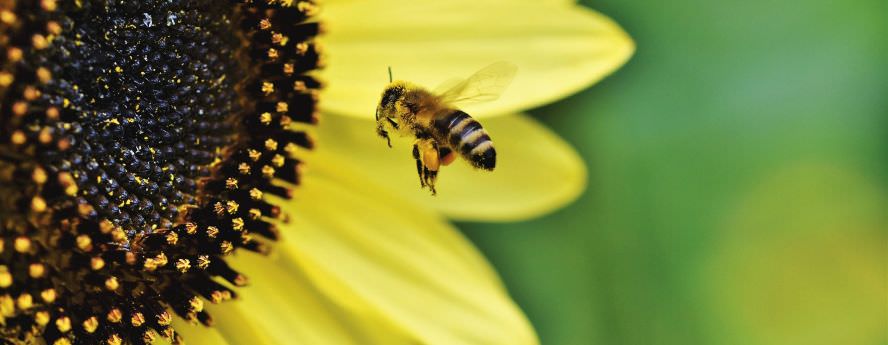
We all know that bees have an important role in pollination, but how much do we know about the substantial contribution they have in keeping us healthy through the effect they have on our environment and food production, and even in supporting the economy?
Bees are essential for a healthy, balanced diet
It’s almost impossible to over-emphasise the importance of pollination in getting the proper nutrition from our food. A large number of our vegetables, fruits and crops need to be fertilised through pollination. In fact, according to The Wildlife Trusts, every third mouthful we eat depends on pollination taking place. And the most effective pollinator of all is generally the bee, being able to carry more pollen and visiting more flowers then other pollinators.
Apart from pollinating the plants that are an important part of a healthy, balanced diet, providing us with fibre and essential vitamins and minerals, the bees also pollinate foraging crops like field beans and clover utilized to feed other animals we rely on for meat, a good source of protein and minerals.
What’s more, the free service bees and other pollinators provide is the equivalent of around £691 million worth of UK crops every year. It would be much more expensive and would take much longer for humans to do the job themselves.
Bees help preserve the ecosystem and biodiversity, the foundation of human health
Biodiversity is the variety of plant and animal species on Earth and the ecosystems (habitats) they live in. Without it, the human population can’t survive. Biodiversity supports the future security of food and promotes resistance to pests and diseases as well as provides important resources for traditional and modern medicine, Convention on Biological Diversity suggests.
According to the international beekeeping organisation Bees for Development, around 80% of the flowering plants species are dependent on pollinators. Compared to other pollinator insects, bees are extremely hairy, thus they are highly effective in catching pollen. A honey bee colony can pollinate around 250 million flowers in a day.
Animals also depend on bees for survival because they feed on plants and the floral growth serves as their home.
Bees are one of the few insects that produce food consumed by humans
Honey bees create the sweet and golden substance that has been used in food and medicine since ancient times – honey. It may constitute a better alternative to refined sugar and raw honey can be a good source of antioxidants, minerals and enzymes (BBC Good Food). Because of its antibacterial effect, it can be used in the treatment of ulcers and wounds.
Honey could also be used as a natural cough medicine for people over one year of age. The NHS recommends mixing one or two teaspoons of honey with the juice of half a lemon and boiled water in a mug and drinking it warm.
Bees contribute to our mental health
Life as we know it today wouldn’t be the same without these hardworking, tiny creatures. They pollinate the plants in our gardens, parks and countryside, they are a symbol of nature and one of the reasons we can enjoy the natural green space and lots of activities like gardening, exercising or relaxing outdoors and being around animals. All these outdoor activities can improve our mood, reduce stress and boost confidence.
But not all is milk and honey in the bee land. Unfortunately, bees population is on decline around the globe, as they are losing their habitat and are affected by pesticides and climate change. More than ever before, we need to be aware of the vital role they play in our lives and help protect our little buzzy friends.
Disclaimer: The content of this website is provided for informational purposes only and does not substitute the medical advice from a healthcare professional.